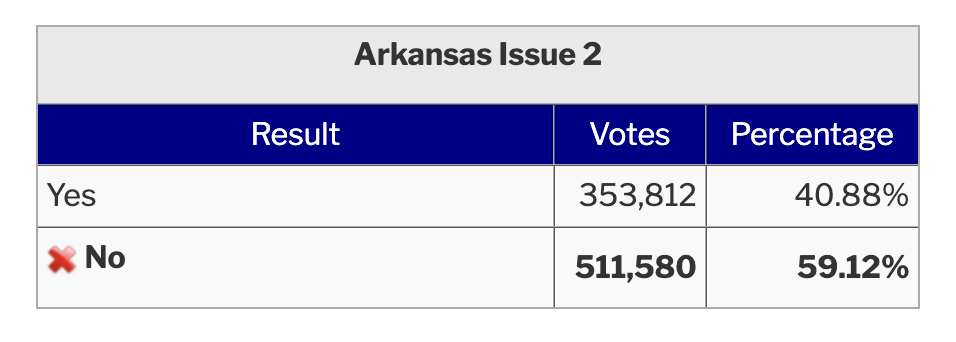Not only does Arkansas use the power of the ballot-box to advance progressive policy, we also fiercely defend it from anti-democratic politicians.
Here in the Natural State, we are celebrating Ohio’s win for the people’s power alongside many others across the country.
All eyes were on the Buckeye State as voters went to the polls in early August to decide on one singular issue: the power of the vote itself. Across the country, forward-thinking people were relieved to see how handily Ohio rejected the measure, which would have made it harder for citizen-led ballot initiatives to pass by requiring a 60% threshold instead of 50% plus one. The significance of the vote has long-term consequences for democracy. There’s also imminent implications because abortion access will be on the Ohio ballot in November of this year. This success means it will be easier for Ohio voters to protect their private healthcare decisions.
Great job, Ohio! But let’s talk about Arkansas.
The exact same issue that Ohio just defeated was on Arkansans’ ballots in 2022. We defeated it by an even larger margin than voters did Ohio.
Our state consistently shows up for this issue. Arkansas’s constitution gives its people important power through direct democracy; in other words, it allows residents to propose their own initiatives and constitutional amendments. We take a lot of pride in our right to direct democracy in the Natural State. In fact, our state motto is “Regnat Populus,” which means “The people rule,” not carpetbagging politicians. We prove our motto true time and time again.

Arkansas’s robust, constitutionally guaranteed direct democracy threatens some politicians, which is why those in power have tried repeatedly to erase the people’s right to ballot initiatives. Fortunately, Arkansas voters have repeatedly rejected their attempts. Our authority-bucking, populist mentality is what makes us who we are. It’s also what makes Arkansas worth investing in for political change.
And we need political change now more than ever. Extremists have overpowered Arkansas’s government, from the governor’s office down to local school boards. Their brazen power grabs, coercion tactics, and unconstitutional policies endanger our state. Consequently, the work to mitigate their harm must take on a new urgency to defend our right to vote.
There’s also the issue of Arkansas’s engagement rate — or should we say disengagement rate. Our state has some of the least engaged voters in the country, and that’s by design. When people are disconnected from policy, we see division, misinformation, and extremism rise. But even with a disconnected electorate and a legislature and governor’s office fraught with radicalism, the people of Arkansas reliably vote against initiatives that take away their direct power.
Fellow Arkansans, this is good news.
Even with gerrymandered districts, strict voter ID laws, and other forms of voter suppression that has led to extremist rule in Arkansas, voters still know the importance of keeping our power of direct democracy. Raising a ballot measure’s passing threshold from a simple majority to 60% is a power grab, and Arkansans treated it as such by soundly rejecting it and keeping that power for themselves.
In 2020, voters rejected legislative attempts to wipe out citizen-led ballot initiatives. At the ballot box, Arkansans consistently agree that voters must keep their power, which has frustrated power-obsessed politicians. Now, legislators have passed an unconstitutional law to change the ballot processes because they are desperate to take power away from the people.
We’re hopeful the law will be struck down as blatantly unconstitutional.
Here in the Natural State, we are stubborn, independent people, and we take our right to direct democracy seriously. When it comes to the ballot box, we’ll use our power to advance populist policies that benefit all Arkansans, not just the wealthy and powerful, and we’ll defend that power against politicians hungry to control us. It’s a bright spot in Arkansas’s dim political reality — one we’re damn proud of.





